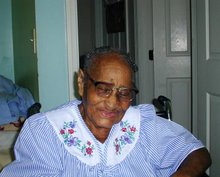1. Developing a strong support system; and
2. Never failing to take care of self.
My husband and I find ourselves in a somewhat unique situation. We are grandchildren caring for the elderly not the actual children. Sadly, there are no children remaining within my grandmothers lineage able to care for her. Not only are there no able-bodied children, there are no other grandchildren able to provide assistance either. While your situation may not be exactly like ours, you may find that other family members are not as eager or willing to take on the roll as caregiver, thus leaving you as sole caregiver.
To develop our support system, we have reached out to many sources or have been contacted by several unlikely sources to provide assistance. Whenever someone opens this door on your behalf don't be afraid to accept a trusted helping hand. Our support system is comprised of respite care, certified nurse assistants, friends, and extended family members with no relation to my grandmother. Even my grandmother's social worker has unknowingly provided that extra push we needed.
If you already tapped into friends and family, but find that is not enough, there are many options available to those who care for the elderly. The Council on Aging is one option. If your loved one suffers from any of the Dementing disorders, including but not limited to Alzheimer's, contact the Alzheimer's Association. For more options visit any of the links contained in the side-bar under "Resource Links".
My second tip centers around caring for self. Caregiving for another is often a thankless responsibility. Not to mention it is often stressful when trying to not only meet but anticipate the needs of another. Especially when the recipient of care is unable to verbalize their needs, or in the case of my grandmother, frequently forgets that assistance is needed and does not want it. In addition to the stress, caregiving is demanding. The demands manifest in many forms, from time constraints, to mental demands, to physical demands. Caring for Flossie is a 24 hour job - she can not be left alone. My grandmother cannot prepare her own meals, transfer easily to the restroom, remember to take her medication, or dress with ease. She cannot bathe herself and struggles with the ability to logically make good decisions on her behalf. Some say, its like having a newborn... most would disagree. There is an adult hidden in the bundle of needs.
So when do you find time to care for yourself? I often felt guilty when I only wanted to spend time doing things unrelated to my grandmother. It is a daily battle to curb the guilt, yet it is imperative for my own mental sanity. As a caregiver, you must take care of you. Find an activity that you can do alone to replenish self. Purposely plan time with your spouse to encourage continued growth and connection as a couple. Take individual time with your children so that they are never lost in the midst of caregiving. Being a caregiver should be classified as one of the many roles you play as an adult NOT define who you are. Just as wife and mother or accountant and husband are not who you are but a part of what you do.
I recommend that caregivers begin by creating a calendar that documents every activity or responsibility. Then find opportunities to the calendar activities unrelated to the person you care for. Whether conducted in the home or out of the home carve out time for you and your family. This is where your support system will play an active role. Perhaps a niece or nephew, sister, or friend can come over for a few hours so you can go out to dinner. Sometimes my husband and I have someone come over to the house and we go into the family room and watch movies for hours without interruption. Sometimes I sit in my grandmother's room with her and read a book at night - she is comforted by my presence while I can drift off to exotic locations in my imagination.
However you achieve this feat... always take time to care for self and expend the effort to build a support system. If you are spent emotionally, physically, spiritually, and mentally you have nothing to give to the person you care for and even worse for your family. I challenge you to start today.
.jpg)








1 comment:
It's hard to prepare for caregiving sometimes. You can take in all the advice, and prepare all you want. But when it's time to do it, the job can still be pretty hard. Support is valuable for the task at hand, indeed. After all, giving care to a person means giving support as well.
Post a Comment